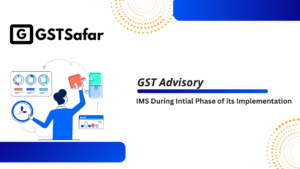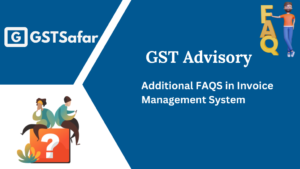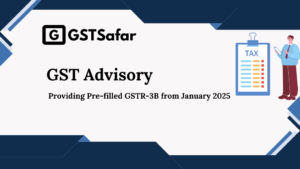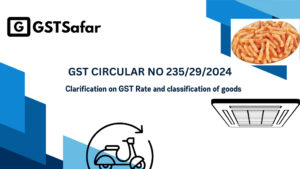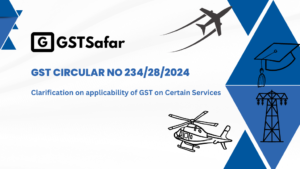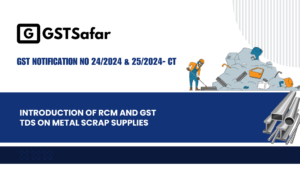GST Registration is the most fundamental requirement under the GST taxation system. This article covers legal provisions relating to the personas liable for GST registration, compulsory GST registration, deemed registration, procedure and cancellation of registration etc.
Legal provisions relating to GST Registration
- Section 22 to 30 of CGST Act 2017
- Rules 8 to 26 of CGST Rules 2017
Types of GST Registration
| Sr No | Details | Section |
| 1 | Persons liable for registration | Section 22 |
| 2 | Compulsory Registration in certain cases | Section 24 |
| 3 | Voluntary Registration | Section 25 (3) |
| 4 | Deemed Registration | Section 26 |
| 5 | Suo-moto Registration or Temporary Registration | Section 25 (8) |
| 6 | Registration as a Casual Taxable Persona | Section 27 |
| 7 | Registration as Non-Residential Taxable Person | Section 27 |
GST Registration based on Threshold Limit
Section 22 of CGST Act 2017
| In the case of supply of services or services and goods both | In the case of supply of only goods |
| GST registration is required if aggregate turnover exceeds Rs 20 lakhs Note: 10 lakhs in the case of special category states | GST registration is required if aggregate turnover exceeds Rs 40 lakhs Note: 10 lakhs in the case of special category states Note: person shall be considered to be engaged exclusively in the supply of goods even if he is engaged in exempt supply of services provided by way of extending deposits, loans or advances in so far as the consideration is represented by way of interest or discount. |
List of special category states in GST
(refer Article 279A and CGST Amendment Act 2018)
- Manipur
- Mizoram
- Nagaland
- Tripura
Meaning of aggregate turnover in GST
Section 2(6) of CGST Act 2017
“aggregate turnover” means the aggregate value of all taxable supplies (excluding the value of inward supplies on which tax is payable by a person on reverse charge basis), exempt supplies, exports of goods or services or both and inter-State supplies of persons having the same Permanent Account Number, to be computed on all India basis but excludes central tax, State tax, Union territory tax, integrated tax and cess;
Where to take GST registration
The registration is required in the state or union territory from where the taxable supply is made. ABC Limited is having aggregate turnover Rs 25 lalkhs. It makes supply from Mumbai, Pune and Ahmedabad. Here ABC Litd is required to get registered in Maharasthra and Gujarat
Example of GST Registration
A & Co is engaged in supply of goods and services both. It is having its turnover as under. Based on that, determine whether A & Co is
Liable for registration or not? If yes, then in which State?
| Nature of supply | Supply from which State? | Supply amount Rs |
| Exempt Supply | Supply from Ahmedabad to Baroda (Supply within Gujarat) | 5,00,000 |
| Taxable Supply | Supply from Mumbai to Nagpur (Supply within Maharashtra) | 6,00,000 |
| Export | From Tamilnadu | 8,00,000 |
| Total | 19,00,000 |
A & Co is not liable for registration even there is taxable supply from Maharashtra as its aggregate turnover does not exceed Rs 20 lakhs
GST registration for persons registered under Earlier Tax Laws
Section 22 of CGST Act 2017
If a person is registered under the earlier laws (Excise/Service Tax/VAT etc) as on the appointed date, then GST law mandates such persons to enroll under GST.
GST registration On transfer of business
Section 22 of CGST Act2017
Where a business carried on by a taxable person registered under GST Act is transferred to another person as a going concern, the transferee shall be liable for registration under GST
GST registration in the case amalgamation or demerger
Section 22 of CGST Act 2017
n a case of transfer pursuant to sanction of a scheme or an arrangement for amalgamation or, as the case may be, de-merger of two or more companies pursuant to an order of a High Court, Tribunal or otherwise, the transferee shall be liable to be registered, with effect from the date on which the Registrar of Companies issues a certificate of incorporation giving effect to such order of the High Court or Tribunal.
Compulsory Registration under GST
The Section 24 of CGST Act 2017 provides for compulsory GST registration notwithstanding that their aggregate turnover is below Rs 20 lakhs/40 lakhs.
In other words under the following cases person will be required to take GST number even though his turnover does not exceed Rs 20 lakhs/40 lakhs as the case may be
Voluntary Registration in GST
Section 25 of CGST Act 2017
A person, though not liable to be registered under section 22 or section 24 may apply for gst number and get himself registered voluntarily, and all provisions of this Act, as are applicable to a registered person, shall apply to such person.
What is advantage of Voluntary GST registration?
Voluntary Registration in GST is advantageous for the purpose supplying goods or services or both to registered persons. The voluntary registration enables a supplier of goods or services or both to enhance its B2B transactions as the business units would prefer receiving supplies from the registered persons only.
What is disadvantage of Voluntary GST registration?
The voluntary GST registration creates liability to pay tax and enhances the compliances burden. It means that once a person obtains voluntary registration, he has to pay tax, file all the GST returns even though his aggregate turnover does not exceed Rs 20 10 lakhs/20 lakhs/40 lakhs as the case may be.
Cancellation of Voluntary GST registration
At present, a voluntary registered person can seek cancellation at any time. This has been made possible vide notification no 03/2018-CT dated 23-01-2018. Prior to this notification, there was one year limitation for cancellation of voluntary GST registration. It is clear that now the application for cancellation of registration, taken on voluntary basis can be considered any time after effective date of registration.
Deemed Registration in GST
Section 26 of CGST Act 2017
There is no burden of taking registration under CGST and SGST/UTGST separately. As per section 26(1), “the grant of registration under SGST Act or UTGST Act shall be deemed to be granted under CGST Act and vice versa.
It is linking provision among all GST Acts that enables the removal of burden of taking registrations under various Acts. It means if registration is granted in once GST Act (CGST/SGST/UTGST) and GSTIN is issued, it will treated as if registration has been granted under all the GST Act including IGST Act. Due to this provision, tax payers do not require to get registered separately in each of the GST Acts.
Deemed Rejection of GST registration
As per Section 26(2) of CGST Act, 2017, “any rejection of application for registration under SGST/UTGST Act shall be deemed to be a rejection of application for registration under CGST Act also.
Suo Moto Registration under GST
Section 25(8) of CGST Act 2017 read with rule 16 of CGST Rules 2017
It is temporary registration by proper officer on suo moto basis. The following are the relevant provisions
Where, pursuant to any survey, enquiry, inspection, search or any other proceedings under the Act, the proper officer finds that a person liable for registration under GST Act has failed to apply for GST registration; such officer may register the said person on a temporary basis and issue an order in FORM GST REG-12
GST registration as a Casual Taxable Person and Non –Resident Taxable Person
Section 27 of CGST Act 2017 read with rule 13 and 15 of CGST Rules 2017
Meaning of Casual Taxable Person in GST
(CTP)
[Section 2(20) of CGST Act 2017]
casual taxable person” means a person who occasionally undertakes transactions involving supply of goods or services or both in the course or furtherance of business, whether as principal, agent or in any other capacity, in a State or a Union territory where he has no fixed place of business;
Meaning of Non-Resident Taxable Person in GST
(NRTP)
[Section 2(77) of CGST Act 2017]
Non-resident taxable person” means any person who occasionally undertakes transactions involving supply of goods or services or both, whether as principal or agent or in any other capacity, but who has no fixed place of business or residence in India
The following provisions are equally applicable on both Casual Taxable Person and of Non-Resident Taxable Person
CTP means Casual Taxable Person and NRTP means Non Resident Taxable Person
No Benefit of Threshold Limit for GST Registration
Both CTP and NRTP have to compulsory get registered under GST irrespective of the threshold limit, at lease 5 days prior to commencement of business
GST Registration before commencement of business
For both of them, not only the application but registration is required compulsorily at lease 5 days prior to commencement of business
Taxable supply after GST registration
The taxable supplies can be made by both the person only after the issuance of GST registration certificate
Advance deposit of GST
At the time of submitting the application for GST registration, CTP/NRTP are required to make an advance deposit of GST in an amount equivalent to the estimated GST liability for the period for which the registration is sought.
Period of Validity of GST Registration Certificate
The GST registration certificate granted to CTP/NRTP will be valid for:
- Period specified in the GST registration application or
- 90 days from the effective date of registration whichever is earlier.
Extension of validity of GST registration
The validity of GST registration can be extended further by a period not exceeding 90 days by making an application before the end of the validity of GST registration granted to him.
Such person will get a TRN for making an advance deposit of tax which shall be credited to his electronic cash ledger. An acknowledgement of receipt of application for registration is issued only after the said deposit.
Exemption from Registration under GST
As per Section 23(1) of CGST Act 2017 following persons shall not be liable for GST registration
- Any person engaged exclusively in the business of supplying goods or services or both that are not liable to tax or wholly exempt from GST Act;
- Any agriculturist, to the extent of supply of produce out of cultivation of land.
- Any person notified by Government by notification
Person making only Reverse Charge supply have been notified by government to be not liable for registration under GST.
When to apply for GST registration?
| Type of person | When to apply for GST registration? |
| Person who is liable to be registered under Section 22 | Within 30 days from the date on which he becomes liable to GST registration |
| Person required to take compulsory registration under Section 24 (except CTP/NRTP) | Within 30 days from the date on which he becomes liable to GST registration |
| Casual Taxable Person (CTP) | At least 5 days prior to the commencement of business |
| Non Resident Taxable Person (NRTP) | At least 5 days prior to the commencement of business |
| Voluntary Registration under Section 25(3) | No time limit ass there is no date at which he may be held liable for registration. |
Format of GST Number
GST Registration number consists of a 15 digit identification number. The allocation of the number to the taxpayer was based on PAN and State of the applicant. In a GST registration number, the first two digits represent the State Code. The following 10 digits represent the PAN of the applicant. In addition, one digit represents entity code, one digit is left blank and the last digit is a check digit.
State Code in GST Number
In gstn number the first two digits representing the state code are as per the 2011 Indian Census. The state code in the GST registration number represent the following states:
| Code | State/Union Territory |
| 01 | Jammu & Kashmir |
| 02 | Himachal Pradesh |
| 03 | Punjab |
| 04 | Chandigarh |
| 05 | Uttarakhand |
| 06 | Haryana |
| 07 | Delhi |
| 08 | Rajasthan |
| 09 | Uttar Pradesh |
| 10 | Bihar |
| 11 | Sikkim |
| 12 | Arunachal Pradesh |
| 13 | Nagaland |
| 14 | Manipur |
| 15 | Mizoram |
| 16 | Tripura |
| 17 | Meghalaya |
| 18 | Assam |
| 19 | West Bengal |
| 20 | Jharkhand |
| 21 | Orissa |
| 22 | Chhattisgarh |
| 23 | Madhya Pradesh |
| 24 | Gujarat |
| 25 | Daman & Diu |
| 26 | Dadra & Nagar Haveli |
| 27 | Maharashtra |
| 28 | Andhra Pradesh |
| 29 | Karnataka |
| 30 | Goa |
| 31 | Lakshadweep |
| 32 | Kerala |
| 33 | Tamil Nadu |
| 34 | Pondicherry |
| 35 | Andaman & Nicobar Islands |
Important points of GST registration
Single Registration
Under GST regime, there is a single registration for all the taxes i.e. CGST, SGST/UTGST, IGST and Cesses. It is clear that registration under GST is not tax specific
State-wise Registrations
If a person’s business is spread over in multiple states, then such supplier is required to take a separate state-wise registration for the branches in different states.
Single GST registration for Different Branches in a single state
A business entity having its multiple branches in the same state does not require multiple registration. Such entity would have single registration wherein it can declare one place as principle place of business and other branches as additional place of business.
Separate GST registration for Multiple Places of Business in a State can be taken
As per the first proviso to Section 25(2) of CGST Act 2017, as substituted by the CGST (Amendment) Act 2018, a person having multiple places of business in a state or union territory may be granted a separate registration for each place of business, subject to such conditions as may be prescribed. It means, now the taxpayers may opt for multiple registration within a state/union territory in respect of multiple places of business located within the same State/Union Territory, subject to conditions enumerated in Rule 11 of the CGST Rules, 2017 as substituted vide Notification No 03/2019 Central Tax, dated 29-1-2019, w.e.f 1-2-2019. (Earlier it was restricted to multiple businesses in the different states)
Note: Previously, there was a concept of “Business Vertical” under CGST Act, 2017. But the relevant definition of Business Vertical given under Section 2(18) has been omitted vide the Central GST (Amendment) Act 2018. In consequence, the first proviso to Section 25(2) has been substituted with new proviso.
GST registration is PAN based
A person can obtain a single registration in each state or UT on a single PAN i.e one registration number GSTIN per state.
GST registration Online
GST registration is take online in GST registration portal. For that one will have to go to GST portal www.gst.gov.in
FAQs
Can a person take two GST registration in same state?
Yes, for each place business in same state. Once a person registered under GST for one place of business, a new GST registration number can be taken for another place of business also in the same state in same PAN.
What is minimum turnover for GST?
If aggregate turnover exceeds Rs 20 lakhs in a year, then GST number is to be taken. This limit is Rs 10 lakhs in the case of special category states. However if in a business there is supply of only goods, then this limit is Rs 40 lakhs.
Can I charge GST if not registered?
GST cannot be charged and collected if one is not registered in GST
Is there any government fees for GST registration
No, there is not any government fees for GST registration. You can register free of charge.
Is gst registration for e commerce seller required?
Yes As per Section 24 of CGST Act 2017 any person who supply through E-commerce portal is compulsorily required to be registered in GST even though hi turnover does not exceed threshold limit of Rs 20/10/40 lakhs as the case may be.
Read similar Articles





